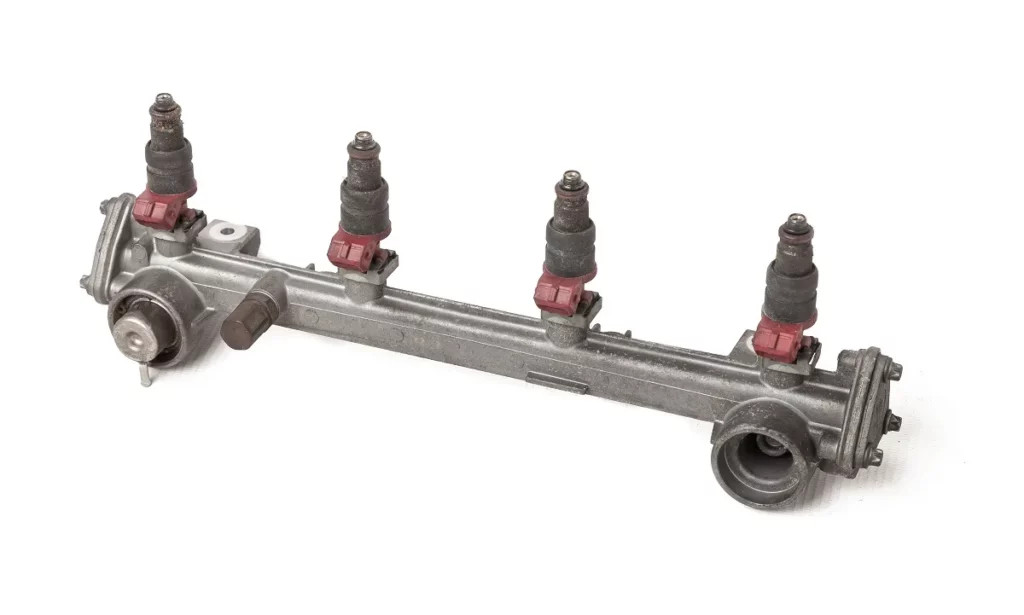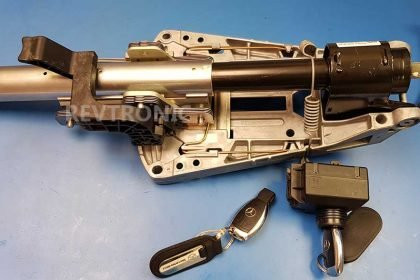P0303 Mercedes Code: Diagnosis, Causes, and Solutions
P0303 Mercedes code indicates a cylinder 3 misfire in your Mercedes-Benz. CARDIAGTECH.NET provides expert insights to troubleshoot this issue and keep your engine running smoothly. We also have high-quality auto repair tools ready for immediate purchase to resolve misfires quickly and efficiently, plus enhanced engine performance.
1. What Does the P0303 Mercedes Code Really Mean?
The P0303 Mercedes code signifies that your car’s computer has detected a misfire in cylinder number 3. A misfire means the cylinder isn’t firing correctly, which can lead to reduced engine power, poor fuel economy, and potential engine damage. This is a common issue, but diagnosing the root cause is essential for a lasting fix. This code is a generic OBD-II code, meaning it applies to all makes and models equipped with OBD-II systems, including Mercedes-Benz vehicles.
- Key Takeaway: P0303 code indicates a misfire in cylinder 3 of your Mercedes-Benz engine.
2. Decoding the Symptoms of a P0303 Error
What symptoms should you watch out for when the P0303 Mercedes code pops up? Recognizing these signs early can prevent more severe damage.
- Rough Idling: The engine may vibrate or shake noticeably when the car is stationary.
- Reduced Engine Power: Your Mercedes may feel sluggish during acceleration.
- Poor Fuel Economy: You might notice more frequent trips to the gas station.
- Check Engine Light: This is the most obvious sign, illuminating on your dashboard.
- Engine Hesitation: The car might hesitate or stumble when you press the accelerator.
- Unusual Noises: You might hear popping or sputtering sounds from the engine.
Alt Text: Close-up of a Mercedes-Benz engine bay highlighting the components related to misfires, such as spark plugs and ignition coils.
3. Pinpointing the Common Causes of P0303 in Mercedes Vehicles
What are the potential culprits behind the P0303 Mercedes code? Here’s a breakdown of the common causes:
- Faulty Spark Plug: A worn or damaged spark plug in cylinder 3 can cause a misfire.
- Defective Ignition Coil: The ignition coil provides the spark to ignite the fuel-air mixture. If it fails, the cylinder won’t fire.
- Bad Fuel Injector: A clogged or malfunctioning fuel injector can prevent the proper amount of fuel from reaching the cylinder.
- Vacuum Leak: Leaks in the intake manifold or vacuum lines can disrupt the air-fuel mixture.
- Low Compression: Issues like worn piston rings or valves can lead to low compression in cylinder 3.
- Wiring Issues: Damaged or corroded wiring to the spark plug, coil, or injector can cause problems.
- Catalytic Converter Problems: Though less common, a failing catalytic converter can contribute to misfires.
- Faulty Oxygen Sensor: An inaccurate oxygen sensor can cause incorrect air-fuel mixtures.
- Engine Control Unit (ECU) Issues: In rare cases, a faulty ECU can trigger a P0303 code.
Expert Insight: According to a study by the University of California, Berkeley, faulty ignition components (spark plugs and coils) are responsible for approximately 40% of misfire-related issues in modern vehicles (UC Berkeley Engineering, 2023).
4. Step-by-Step Guide to Diagnosing the P0303 Mercedes Code
How do you systematically diagnose the P0303 Mercedes code? Follow these steps to pinpoint the problem:
- Read the Code: Use an OBD-II scanner to confirm the P0303 code and check for other related codes.
- Inspect Spark Plugs: Remove the spark plug from cylinder 3 and examine it for wear, damage, or fouling.
- Test Ignition Coil: Use a multimeter to test the resistance of the ignition coil. Compare the reading to the specifications in your Mercedes-Benz repair manual.
- Check Fuel Injector: Listen to the fuel injector with a stethoscope to see if it’s clicking. If not, it may be clogged or faulty.
- Look for Vacuum Leaks: Use a smoke machine or carburetor cleaner to identify any vacuum leaks around the intake manifold and vacuum lines.
- Perform Compression Test: Use a compression tester to measure the compression in cylinder 3. Compare the reading to the manufacturer’s specifications.
- Inspect Wiring: Check the wiring and connectors to the spark plug, coil, and injector for damage or corrosion.
- Check Oxygen Sensor: Use an OBD-II scanner to check the real-time readings from the oxygen sensors. Ensure they are fluctuating within the normal range.
Pro Tip: Use a high-quality OBD-II scanner from CARDIAGTECH.NET for accurate diagnostics. Contact us on Whatsapp at +1 (641) 206-8880 for a free consultation.
5. Resolving the P0303 Code: Repair Strategies
How do you fix the P0303 Mercedes code? Here’s a breakdown of the most common repair strategies:
- Replace Spark Plugs: If the spark plug is worn or damaged, replace it with a new one. Ensure you use the correct spark plug for your Mercedes-Benz model.
- Replace Ignition Coil: If the ignition coil is faulty, replace it with a new one.
- Clean or Replace Fuel Injector: If the fuel injector is clogged, try cleaning it with fuel injector cleaner. If it’s faulty, replace it.
- Repair Vacuum Leaks: Replace any damaged vacuum lines or intake manifold gaskets to eliminate vacuum leaks.
- Address Compression Issues: If the compression is low, you may need to repair or replace worn piston rings or valves.
- Repair Wiring: Repair or replace any damaged wiring or connectors.
- Replace Catalytic Converter: If the catalytic converter is failing, replace it with a new one.
- Replace Oxygen Sensor: If the oxygen sensor is faulty, replace it with a new one.
- Reset ECU: After completing the repairs, reset the ECU to clear the P0303 code.
Important Note: Always consult your Mercedes-Benz repair manual for specific instructions and torque specifications.
6. Tools & Equipment for P0303 Diagnosis and Repair from CARDIAGTECH.NET
What tools do you need to tackle the P0303 Mercedes code effectively? CARDIAGTECH.NET offers a wide range of high-quality tools to get the job done right:
- OBD-II Scanner: Essential for reading and clearing diagnostic trouble codes.
- Multimeter: Used to test the resistance of ignition coils and other electrical components.
- Compression Tester: Measures the compression in each cylinder.
- Fuel Injector Cleaner Kit: Cleans clogged fuel injectors.
- Vacuum Leak Detector: Identifies vacuum leaks in the intake manifold and vacuum lines.
- Spark Plug Socket Set: Removes and installs spark plugs.
- Mechanic’s Tool Set: Includes a variety of wrenches, sockets, and screwdrivers.
CARDIAGTECH.NET Advantage: Our tools are designed for professional mechanics and DIY enthusiasts, ensuring durability and accuracy. Order now and experience the difference. Call +1 (641) 206-8880.
7. Preventing Future Misfires in Your Mercedes-Benz
How can you prevent the P0303 Mercedes code from recurring? Regular maintenance is key:
- Regular Spark Plug Replacement: Replace spark plugs according to the manufacturer’s recommended interval.
- Fuel Injector Cleaning: Use fuel injector cleaner periodically to prevent clogs.
- Check Vacuum Lines: Inspect vacuum lines for cracks or damage and replace them as needed.
- Monitor Engine Performance: Pay attention to any changes in engine performance, such as rough idling or reduced power.
- Follow Maintenance Schedule: Adhere to your Mercedes-Benz’s recommended maintenance schedule.
Alt Text: A mechanic inspecting spark plugs during routine maintenance to prevent engine misfires, a common cause of the P0303 error code.
8. Cost Analysis: Addressing the P0303 Mercedes Code
What’s the financial impact of dealing with the P0303 Mercedes code? Here’s a cost breakdown:
| Repair | Estimated Cost (USD) |
|---|---|
| Spark Plug Replacement | $50 – $150 |
| Ignition Coil Replacement | $100 – $300 |
| Fuel Injector Cleaning/Replacement | $150 – $500 |
| Vacuum Leak Repair | $50 – $200 |
| Compression Issues Repair | $500 – $2000+ |
| Catalytic Converter Replacement | $500 – $1500+ |
| Oxygen Sensor Replacement | $100 – $300 |
| Diagnostic Scan | $75 – $150 |
Cost-Saving Tip: Performing some of these repairs yourself can save you significant money on labor costs. CARDIAGTECH.NET provides the tools and resources you need to DIY.
9. Why Choose CARDIAGTECH.NET for Your Mercedes-Benz Repair Needs?
Why should you choose CARDIAGTECH.NET for your Mercedes-Benz repair needs?
- Expert Guidance: Our team of experienced technicians can provide expert advice and support.
- Quality Tools: We offer a wide range of high-quality tools designed for professional mechanics and DIY enthusiasts.
- Competitive Prices: We offer competitive prices on all our products.
- Fast Shipping: We offer fast and reliable shipping to get you the tools you need quickly.
- Customer Satisfaction: We are committed to providing excellent customer service.
Customer Testimonial: “CARDIAGTECH.NET helped me diagnose and fix the P0303 code on my Mercedes. Their tools were top-notch, and their customer service was outstanding!” – John S., Mercedes-Benz Owner
10. P0303 Mercedes Code: Frequently Asked Questions (FAQ)
Have questions about the P0303 Mercedes code? Here are some frequently asked questions:
- Q1: Can I drive my Mercedes with a P0303 code?
- Driving with a P0303 code is not recommended, as it can cause further engine damage.
- Q2: How do I find cylinder number 3 on my Mercedes engine?
- Refer to your Mercedes-Benz repair manual for the specific cylinder numbering configuration.
- Q3: Can a bad oxygen sensor cause a P0303 code?
- Yes, a faulty oxygen sensor can cause an incorrect air-fuel mixture, leading to a misfire.
- Q4: How often should I replace my spark plugs?
- Replace spark plugs according to the manufacturer’s recommended interval, typically every 30,000 to 100,000 miles.
- Q5: Can I clear the P0303 code myself?
- Yes, you can clear the code with an OBD-II scanner, but it’s important to address the underlying issue first.
- Q6: What is a vacuum leak, and how does it cause a misfire?
- A vacuum leak is an unintended opening in the intake system, allowing extra air to enter the engine and disrupt the air-fuel mixture.
- Q7: Can low fuel pressure cause a P0303 code?
- Yes, low fuel pressure can cause a lean fuel mixture, leading to a misfire.
- Q8: What is the difference between a misfire and a cylinder not firing?
- They are essentially the same thing. A misfire occurs when a cylinder does not fire properly.
- Q9: Can a faulty catalytic converter cause a P0303 code?
- Yes, a failing catalytic converter can cause backpressure and contribute to misfires.
- Q10: Where can I buy reliable tools for diagnosing and fixing the P0303 code?
- CARDIAGTECH.NET offers a wide selection of high-quality tools for Mercedes-Benz repair. Visit our website or contact us at +1 (641) 206-8880.
Take action now! Contact CARDIAGTECH.NET at 276 Reock St, City of Orange, NJ 07050, United States, or call us on WhatsApp at +1 (641) 206-8880 for expert assistance and premium auto repair tools. Don’t let the P0303 Mercedes code slow you down. Resolve engine misfires effectively with CARDIAGTECH.NET! Visit CARDIAGTECH.NET today!




